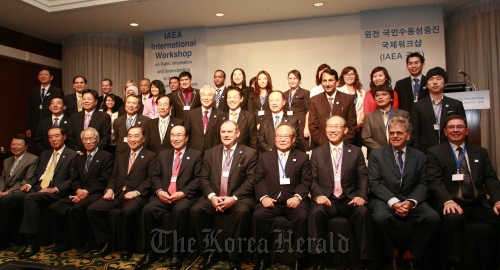Nuclear experts aim to allay fears of atomic energy after Japan crisis
The International Atomic Energy Agency’s workshop for public information on new nuclear power plants kicked off in Seoul on Monday.
The five-day event organized by the Korea Nuclear Energy Promotion Agency in collaboration with the International Atomic Energy Agency is aimed at sharing information among communication professionals in the nuclear power industry and to seek ways to improve public awareness of nuclear power. In addition, the Korea Nuclear Energy Promotion Agency hopes to lay the foundations for facilitating Korea’s involvement in overseas nuclear power plant construction projects in the future. In December 2009, Korea became the world’s fifth country to export nuclear power technology when a consortium led by Korea Electric Power Corp. was selected to carry out a $40 billion nuclear power project in the United Arab Emirates.
“The IAEA International Workshop started from the recognition that the major obstacle facing the government would be the issue of the public acceptance in the process of the nuclear energy policy implementation,” said Korea Nuclear Energy Promotion Agency Chairman Rhee Jae-hwan.
Rhee added that while public fear of nuclear power is growing, fueled by the developments at Japan’s Fukushima Daiichi nuclear power plant, environmentalists are magnifying that fear by “neglecting the efficiency of the nuclear energy and exaggerating the danger and the negative side.
 |
Participants of the workshop on public information on introducing new nuclear power plants including Korea Nuclear Energy Promotion Agency chairman Rhee Jae-hwan (fifth from left, front row) and International Atomic Energy Agency deputy director general Alexander Bychkov (sixth from left, front row) pose at the Lotte Hotel World in southeastern Seoul on Monday.(KNEPA) |
“However, there is no doubt that nuclear energy is the most realistic alternative to the current fossil fuels to prevent climate change,” Rhee said. “We hope the ‘IAEA International Nuclear Public Acceptance Workshop’ will give us a clue of what we must do to enhance the public acceptance through sharing the theoretical knowledge as well as the practical strategy, Korea’s experience and own methods.”
Attending the event are 26 public relations and information experts, who have more than five years of experience in their field, from 14 countries that have or plan to build nuclear power plants.
At the event, the participants will attend lectures on issues regarding communications in relation to nuclear power, with topics focusing on communicating crisis management processes and the basic principles of related communication.
The attendants will also visit industrial sites including the Gori Nuclear Power Plant and Doosan Heavy Industries’ facilities.
On the opening day, IAEA Deputy Director General and Head of Dept. of Nuclear Energy Alexander Bychkov echoed Rhee’s concerns over the rising fears regarding nuclear power and the need for nuclear industry to address the issue.
“We need to respond urgently to the public’s anxiety caused by the accident, while maintaining a firm long-term commitment to continuously improving nuclear safety and performance,” Bychkov said. He added that while some countries have decided to phase out nuclear power, it will continue to be an important issue as long as existing facilities continue to operate, and that the number of nuclear reactors continue to rise.
According to the IAEA’s estimates, the number of reactors in operation across the world could increase by as many as 350 by 2030.
“One of the important lessons learned from the Fukushima accidents is the importance of the dissemination of information. Timely dissemination of information to the public is important for both the planning and the implementation phases of protective and other actions in local and regional areas but also the dissemination of information regarding the possible impact of the accident on neighboring countries.”
By Choi He-suk (
cheesuk@heraldcorp.com)





![[Today’s K-pop] Blackpink’s Jennie, Lisa invited to Coachella as solo acts](http://res.heraldm.com/phpwas/restmb_idxmake.php?idx=644&simg=/content/image/2024/11/21/20241121050099_0.jpg)


